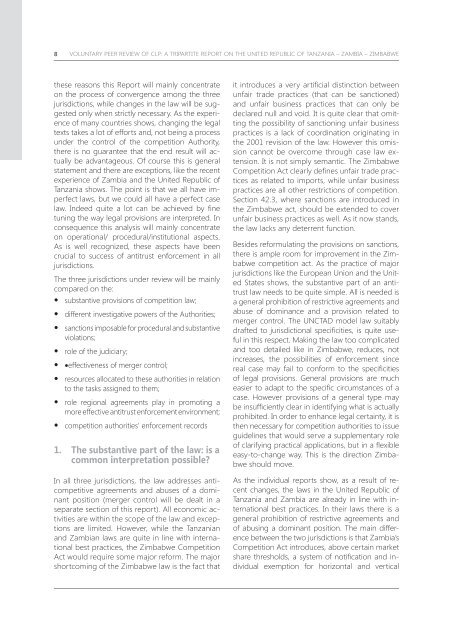a tripartite report - Unctad
a tripartite report - Unctad
a tripartite report - Unctad
Create successful ePaper yourself
Turn your PDF publications into a flip-book with our unique Google optimized e-Paper software.
8 VOLUNTARY PEER REVIEW OF CLP: A TRIPARTITE REPORT ON THE UNITED REPUBLIC OF TANZANIA – ZAMBIA – ZIMBABWE<br />
these reasons this Report will mainly concentrate<br />
on the process of convergence among the three<br />
jurisdictions, while changes in the law will be suggested<br />
only when strictly necessary. As the experience<br />
of many countries shows, changing the legal<br />
texts takes a lot of efforts and, not being a process<br />
under the control of the competition Authority,<br />
there is no guarantee that the end result will actually<br />
be advantageous. Of course this is general<br />
statement and there are exceptions, like the recent<br />
experience of Zambia and the United Republic of<br />
Tanzania shows. The point is that we all have imperfect<br />
laws, but we could all have a perfect case<br />
<br />
tuning the way legal provisions are interpreted. In<br />
consequence this analysis will mainly concentrate<br />
on operational/ procedural/institutional aspects.<br />
As is well recognized, these aspects have been<br />
crucial to success of antitrust enforcement in all<br />
jurisdictions.<br />
The three jurisdictions under review will be mainly<br />
compared on the:<br />
substantive provisions of competition law;<br />
different investigative powers of the Authorities;<br />
sanctions imposable for procedural and substantive<br />
violations;<br />
role of the judiciary;<br />
•effectiveness of merger control;<br />
resources allocated to these authorities in relation<br />
to the tasks assigned to them;<br />
role regional agreements play in promoting a<br />
more effective antitrust enforcement environment;<br />
competition authorities’ enforcement records<br />
1. The substantive part of the law: is a<br />
common interpretation possible?<br />
In all three jurisdictions, the law addresses anticompetitive<br />
agreements and abuses of a dominant<br />
position (merger control will be dealt in a<br />
separate section of this <strong>report</strong>). All economic activities<br />
are within the scope of the law and exceptions<br />
are limited. However, while the Tanzanian<br />
and Zambian laws are quite in line with international<br />
best practices, the Zimbabwe Competition<br />
Act would require some major reform. The major<br />
shortcoming of the Zimbabwe law is the fact that<br />
<br />
unfair trade practices (that can be sanctioned)<br />
and unfair business practices that can only be<br />
declared null and void. It is quite clear that omitting<br />
the possibility of sanctioning unfair business<br />
practices is a lack of coordination originating in<br />
the 2001 revision of the law. However this omission<br />
cannot be overcome through case law extension.<br />
It is not simply semantic. The Zimbabwe<br />
tices<br />
as related to imports, while unfair business<br />
practices are all other restrictions of competition.<br />
Section 42.3, where sanctions are introduced in<br />
the Zimbabwe act, should be extended to cover<br />
unfair business practices as well. As it now stands,<br />
the law lacks any deterrent function.<br />
Besides reformulating the provisions on sanctions,<br />
there is ample room for improvement in the Zimbabwe<br />
competition act. As the practice of major<br />
jurisdictions like the European Union and the United<br />
States shows, the substantive part of an antitrust<br />
law needs to be quite simple. All is needed is<br />
a general prohibition of restrictive agreements and<br />
abuse of dominance and a provision related to<br />
merger control. The UNCTAD model law suitably<br />
ful<br />
in this respect. Making the law too complicated<br />
and too detailed like in Zimbabwe, reduces, not<br />
increases, the possibilities of enforcement since<br />
<br />
of legal provisions. General provisions are much<br />
<br />
case. However provisions of a general type may<br />
<br />
prohibited. In order to enhance legal certainty, it is<br />
then necessary for competition authorities to issue<br />
guidelines that would serve a supplementary role<br />
<br />
easy-to-change way. This is the direction Zimbabwe<br />
should move.<br />
As the individual <strong>report</strong>s show, as a result of recent<br />
changes, the laws in the United Republic of<br />
Tanzania and Zambia are already in line with international<br />
best practices. In their laws there is a<br />
general prohibition of restrictive agreements and<br />
of abusing a dominant position. The main difference<br />
between the two jurisdictions is that Zambia’s<br />
Competition Act introduces, above certain market<br />
dividual<br />
exemption for horizontal and vertical

















